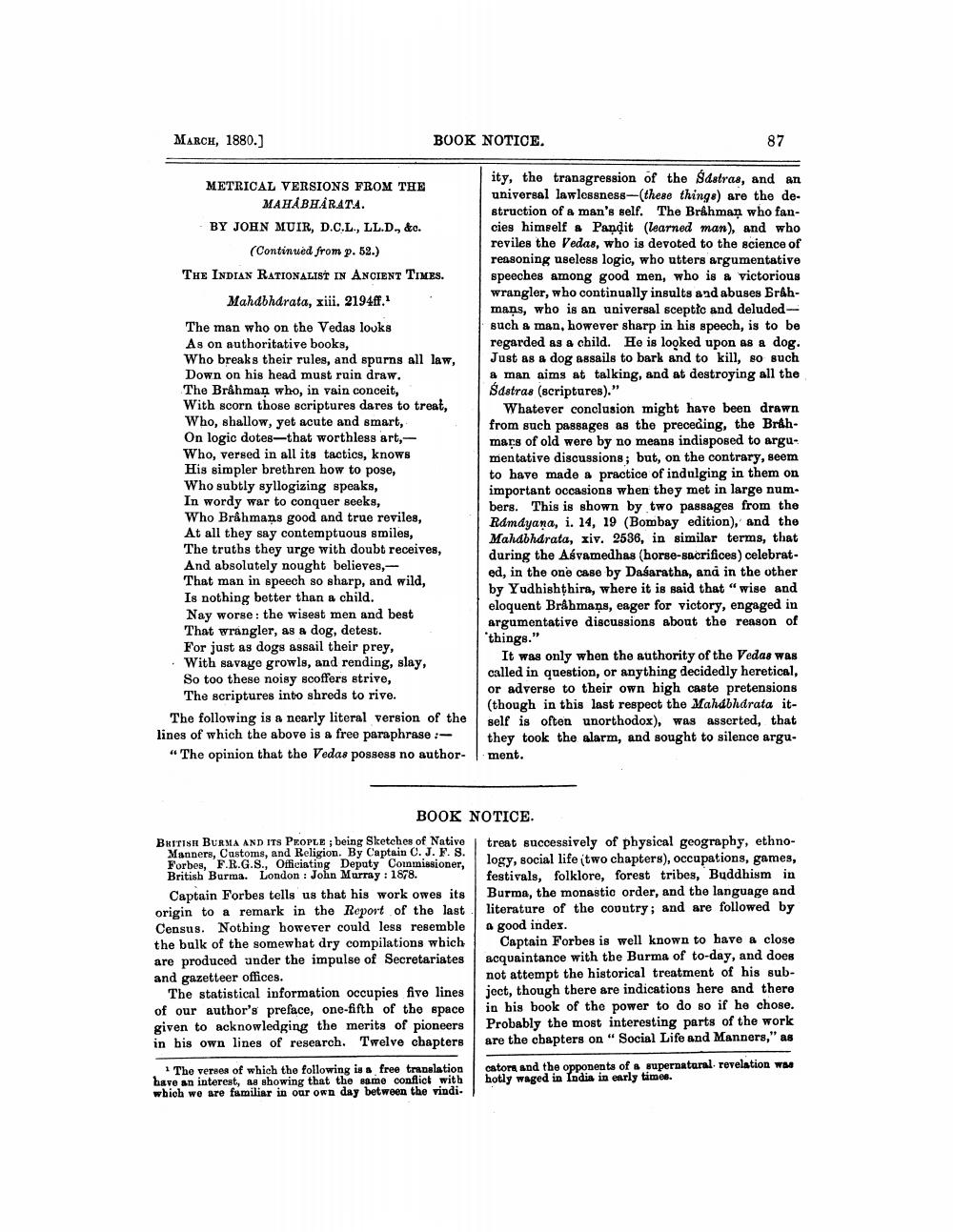________________
MARCH, 1880.]
BOOK NOTICE.
METRICAL VERSIONS FROM THE
MAHABHARATA. BY JOHN MUIR, D.C.L., LL.D, &c.
(Continued from p. 52.) THE INDIAN RATIONALIST IN ANCIENT TIMES.
Mahabharata, xiii. 2194ff." The man who on the Vedas louks As on authoritative books, Who breaks their rules, and spurns all law, Down on his head must ruin draw. The Brâhman who, in vain conceit, With scorn those scriptures dares to treat, Who, shallow, yet acute and smart, On logic dotes-that worthless art, - Who, versed in all its tactics, knows His simpler brethren how to pose, Who subtly syllogizing speaks, In wordy war to conquer seeks, Who Brahmans good and true reviles, At all they say contemptuous smiles, The truths they urge with doubt receives, And absolutely nought believes,That man in speech so sharp, and wild, Is nothing better than a child. Nay worse: the wisest men and best That wrangler, as a dog, detest.
For just as dogs assail their prey, · With savage growls, and rending, slay,
So too these noisy scoffers strive,
The scriptures into shreds to rive. The following is a nearly literal version of the lines of which the above is a free paraphrase :
"The opinion that the Vedas possess no author-
ity, the tranagression of the Sastras, and an universal lawlessness-(these things) are the destruction of a man's self. The Brahman who fancies himself a Pandit (learned man), and who reviles the Vedas, who is devoted to the science of reasoning useless logic, who utters argumentative speeches among good men, who is a victorious wrangler, who continually insults and abuses Brahmans, who is an universal sceptic and deludedsuch a man, however sharp in his speech, is to be regarded as a child. He is looked upon as a dog. Just as a dog assails to bark and to kill, so such a man aims at talking, and at destroying all the $dstras (scriptures)."
Whatever conclusion might have been drawn from such passages as the preceding, the Brahmars of old were by no means indisposed to argumentative discussions; but, on the contrary, seem to have made a practice of indulging in them on important occasions when they met in large num. bers. This is shown by two passages from the Ramdyana, i. 14, 19 (Bombay edition), and the Mahabharata, xiv. 2536, in similar terms, that during the Asvamedhas (horse-sacrifices) celebrated, in the one case by Dasaratha, and in the other by Yudhishthirs, where it is said that “wise and eloquent Bråhmans, eager for victory, engaged in argumentative discussions about the reason of things."
It was only when the authority of the Vedas was called in question, or anything decidedly heretical, or adverse to their own high caste pretensions (though in this last respect the Mahabharata itself is often unorthodox), was asserted, that they took the alarm, and sought to silence argument.
BOOK NOTICE. BRITISH BURMA AND ITS PEOPLE ; being Sketches of Native treat successively of physical geography, ethno
Manners, Customs, and Religion. By Captain 0. J. F. S. Forbes, F.R.G.S., Officiating Deputy Commissioner,
logy, social life (two chapters), occupations, games, British Burma. London: John Murray : 1878.
festivals, folklore, forest tribes, Buddhism in Captain Forbes tells us that his work owes its Burma, the monastic order, and the language and origin to a remark in the Report of the last literature of the country; and are followed by Census. Nothing however could less resemble a good index. the bulk of the somewhat dry compilations which Captain Forbes is well known to have a close are produced under the impulse of Secretariates acquaintance with the Burma of to-day, and does and gazetteer offices.
not attempt the historical treatment of his subThe statistical information occupies five lines ject, though there are indications here and there of our author's preface, one-fifth of the space in his book of the power to do so if he chose. given to acknowledging the merits of pioneers Probably the most interesting parts of the work in his own lines of research. Twelve chapters are the chapters on "Social Life and Manners," as
The verser of which the following is a free translation have an interest, as showing that the same conflict with which we are familiar in our own day between the vindi
cators and the opponents of a supernatural revelation was hotly waged in India in early times.




